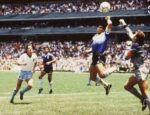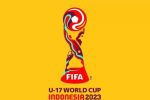The FIFA World Cup always provides fans with plenty of joy and heartbreak but most of all, drama and controversial moments. You should expect some controversy yet again later this year in Qatar, as players tend to use every means possible to ensure victory.
FootballOrbit brings you 10 of the most controversial moments in FIFA World Cup history.
Battle of Santiago (1962)
One of the most controversial matches in FIFA World Cup history, the ‘‘Battle of Santiago’’ took place in 1962 between Chile and Italy. Amidst clear tensions after Italian journalists called the Chilean capital, Santiago, a “dump site” and also questioned the beauty and morals of Chilean women.
Both sides went on to assault each other during the match.
The first foul came after just 12 seconds and the first sending off was in the 12th minute. Punches, kicks, and numerous scuffles throughout the game meant that the police were forced to intervene THREE times during the match, which Chile eventually won 2-0.
Geoff Hurst’s ‘ghost goal’ (1966)
Few moments in football history have provoked such fierce debate as Geoff Hurst’s controversial second goal for England against West Germany in the 1966 World Cup final at Wembley.
With the game tied at 2-2 in extra-time, the deadlock got broken again in the 101st minute in the most dramatic of fashions.
English striker Geoff Hurst received a cross from Alan Ball in the penalty area and then turned quickly before unleashing a powerful shot that bounced straight down after hitting the underside of the crossbar.
Referee Gottfried Dienst was uncertain whether the ball had crossed the goalline or not, he decided to consult linesman Tofiq Bahramov.
England fans inside Wembley held their breath…….
After a brief moment of conversation, the linesman told the referee that the ball indeed crossed the line and the goal was awarded.
England held their nerve and ended up winning the game 4-2 to clinch their first and so far only World Cup, on home turf.
Maradona’s “Hand of god” (1986)
The 1986 quarter-final between England and Argentina is one of the most controversial moments in football history, not just at the World Cup.
The second half of the match saw one of the most infamous moments ever followed by one of the greatest goals of all-time.
In the 51st minute, Maradona punched the ball into the net with his hand when he jumped up against England goalkeeper Peter Shilton to put Argentina 1-0 ahead.
The officials failed to spot the foul and awarded the goal despite numerous pleas by the English players.
A truly incredible moment of cheating by one of the greatest players ever, who would lead Argentina to glory that year.
Maradona claimed after the match that the first goal was scored “a little with the head of Maradona, and a little with the hand of God”.
He later said he considered the goal to be “symbolic revenge” for the United Kingdom’s victory over Argentina in the Falklands War four years earlier.
Just four minutes later, Maradona then produced a moment of magic by scoring what will later be dubbed as the ”Goal of the Century”, as he picked up the ball in his own half before dashing past numerous English players and then putting the goalkeeper on his backside before tapping the ball home to give Argentina a 2-0 lead.
The game finished 2-1 with Gary Lineker scoring a consolation goal for England, but who knows what the outcome would have been if Maradona’s first goal had been cancelled for handball.
What if?
Diego Maradona fails drug test! (1994)
After his “hand of god” goal in 1986, Diego Maradona was at the centre of another controversy 8 years later.
Argentina were one of the favourites to lift the 1994 World Cup hosted by the USA largely due to the presence of Maradona. But the world of football was shocked to hear that “el Diego” had failed a drug test.
He had earlier been suspended from the Italian league in 1991 for 15 months for testing positive for cocaine.
The controversial yet irresistible footballer scored one of the goals of the tournament in the opening game against Greece and made one of the most remarkable World Cup goal celebrations as he ran towards one of the sideline cameras shouting with a distorted face and bulging eyes, in sheer elation of his return to international football.
However, following Argentina’s second group game against Nigeria, the world was stunned when FIFA announced that Maradona had tested positive for a banned substance called ephedrine.
He missed the rest of the tournament and was again banned for 15 months.
Argentina found it difficult to progress without their superstar forward and got eliminated at the round of 16 by Romania.
South Korea’s controversial run to the semifinal (2002)
South Korea co-hosted the 2002 FIFA World Cup with Japan. The Koreans were not regarded as football heavyweights but shocked the world by reaching the semifinals.
But their adventure was tainted by controversies of alleged bribery and match-fixing.
In their last group game against Portugal, two Portuguese players were sent off and thereafter, Korea scored the goal which sent them through to the knockout stages for the first time in their history.
But they would have to face Italy in the round of 16. The Italian team comprised the likes of Maldini, Buffon Cannavaro, Totti, Nesta, Inzaghi, Materazzi, Pirlo and Vieri.
The 2002 FIFA World Cup was the last tournament in which the golden goal was used. South Korea’s Ahn Jung-hwan scored with three minutes left in extra time to send South Korea into the quarter-finals.
During the game, Ecuadorian referee, Byron Moreno, allowed South Korea to press and foul the Italians aggressively throughout, including a two-footed challenge on Zambrotta and an elbow on Alessandro del Piero, but no cards were shown to the South Koreans.
Francesco Totti received a second yellow card for diving in the penalty box and was controversially sent off, though replays showed that it certainly wasn’t a dive.
Italy also had two goals wrongly disallowed for offside. After the game, the Italians were extremely angry.
More controversy would follow as South Korea knocked out Spain on penalties in the quarter-finals. This time, Egyptian referee, Gamal Al-Gandhour, wrongfully disallowed two Spanish goals and made a lot of offside calls against Spain.
For the first goal, a free kick came off a South Korean defender and into the net but was disallowed. The second occurred two minutes into extra-time when the linesman flagged that the ball had gone out of play on the touchline though replays proved that it didn’t.
The game went into penalty shootout and the South Koreans converted all 5 of their penalty kicks and secured a spot in the semi-finals against Germany.
The South Koreans were finally defeated 1-0 by Germany.
Both referees were forced to retire shortly after the tournament due to amidst reports of match-fixing and being bribed to help South Korea advance.
Referee gives the same player three yellow cards! (2006)
In the deciding game for the Group F runners-up place between Croatia and Australia at the 2006 FIFA World Cup in Germany, the English referee Graham Poll mistakenly issued three yellow cards to Croatian defender Josip Šimunić before sending him off.
Šimunić was shown a yellow card by Poll in the 61st minute for a foul on Harry Kewell. In the 89th minute, Poll again showed Šimunić a 2nd yellow card for another foul, but incredibly didn’t send him off.
In the 93rd minute, after Poll had blown the final whistle, Šimunić approached the referee angrily and remonstrated with him. Poll then issued Šimunić a “third” yellow card and also a red card.
After the game, Poll explained what happened: “In the 89th minute, when I produced the yellow, I wrote down the right jersey number but the wrong name. I had inadvertently given the yellow to the Australian No. 3, Craig Moore. This is the first time something like this has happened to me in my 26-year-long career.”
But his explanation wasn’t enough as FIFA sent him home and he subsequently retired from officiating International matches.
Apparently, the referee mistook Šimunić as an Australian player due to his strong Australian accent.
Šimunić was actually born in Australia.
Zinedine Zidane’s headbutt on Materazzi (2006)
The 2006 FIFA World Cup final between France and Italy should have been the perfect ending to Zidane’s glorious international career but it eventually ended in disgrace for the Frenchman.
The match ended 1-1 after 90 minutes.
In extra-time, out of nowhere, Zidane headbutted Italian defender Marco Materazzi!
The midfielder was consequently shown a straight red card by referee Horacio Elizondo after consulting with other officials.
It was later reported that Materazzi had insulted Zidane’s sister which provoked him to headbutt the Italian.
Materazzi later admitted that he indeed insulted Zidane’s sister moments before the headbutting incident.
France were eventually beaten on penalties as the Azzurri clinched the greatest prize of all.
All the post-match talks should have been about Italy’s triumph but Zidane stole the headlines as he bowed out of international duty in an unfortunate manner.
Frank Lampard’s No-Goal (2010)
A karma moment for England’s 1966 final defeat of Germany?
In the 2010 FIFA World Cup in South Africa, during a quarter-final match between England and Germany, the Germans were leading 2-1.
Frank Lampard then hit a shot from just outside the box which hit the crossbar and appeared to have crossed the line. It rebounded back over the line and German goalkeeper Manuel Neuer caught the ball and carried on.
Almost everyone in the stadium believed that the ball went in, but unlike 1966, the referee did not give the goal. Germany would eventually go on to win 4-1.
This controversial moment prompted many observers to start calling for video technology in football. And it was one of the major moments that gave birth to the introduction of the goal-line technology in football.
Luis Suarez handball vs Ghana (2010)
Luis Suarez is a controversial player and especially loves making epic headlines on the FIFA World Cup stage.
Suarez made his debut appearance at the World Cup in 2010 and in the quarter-final against Ghana, the score was 1–1 at the end of regulation time and the match went into extra time.
Late in extra time, Ghana sent a free-kick into the box, and Suárez blocked Stephen Appiah’s shot on the goal line. He then blocked Dominic Adiyiah’s goalbound header with his hands, committing a “professional foul” to save what would have been the game winning goal and was sent off.
Fortunately for Uruguay, Asamoah Gyan hit the crossbar from the ensuing penalty kick and Suárez, who had stopped to watch, celebrated the miss before heading down the tunnel.
Uruguay won the match 4–2 by penalty shootout and advanced to the semi-finals.
After the match, Suárez said, “I made the best save of the tournament!!!”
Suarez bites Chiellini (2014)
Suarez was at it again at the 2014 World Cup in Brazil.
During Uruguay’s final group match against Italy, Uruguay needed a win to advance to the knockout stage while Italy only needed a draw. In the 79th minute and with the score at 0–0, Suárez got very frustrated and clashed with Italian defender Giorgio Chiellini while waiting for a cross then he bizarrely bited him!
FIFA Disciplinary Committee banned Suárez for nine(9) international matches with immediate effect, meaning he would take no further part in that World Cup. The ban also ruled him out of 2015 Copa América.
It was the longest such ban in World Cup history, exceeding the eight-match ban handed to Italy’s Mauro Tassotti for breaking the nose of Spain’s Luis Enrique at the 1994 World Cup.
He was also banned from taking part in any football-related activity (including entering any stadium) for four months and fined CHF100,000 (£66,000).
Notable Mentions
¶Germany and Austria conspire against Algeria (1982)
¶Argentina’s 1978 World Cup win (1978)
¶Harald Schumacher knocks out Patrick Battiston (1982)
¶Italy’s fascism versus France (1938)
¶World Cup trophy stolen! (1966)
¶Andre Escobar own for Columbia got him assassinated (1994)


